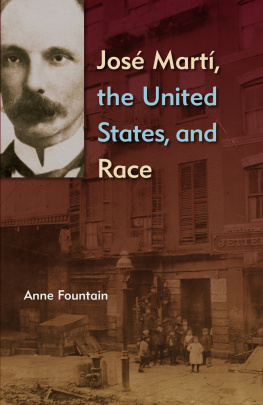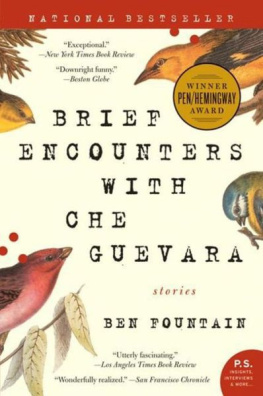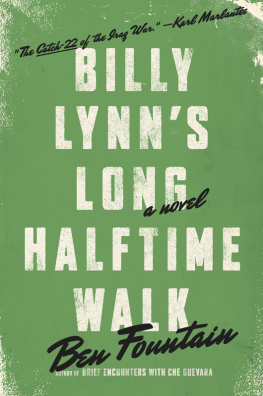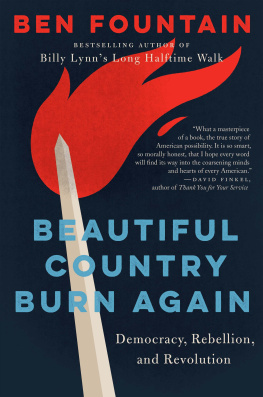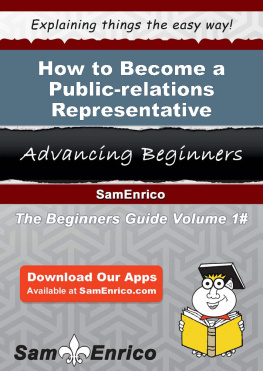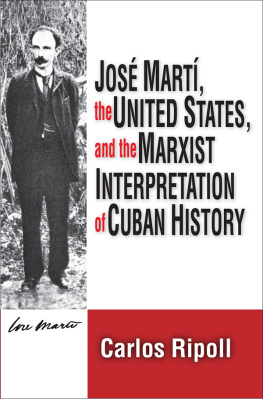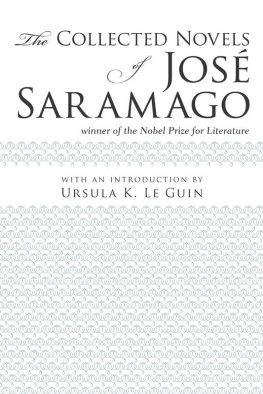Fountain - José Martí, the United States, and Race
Here you can read online Fountain - José Martí, the United States, and Race full text of the book (entire story) in english for free. Download pdf and epub, get meaning, cover and reviews about this ebook. year: 2014;2017, publisher: University Press of Florida, genre: Politics. Description of the work, (preface) as well as reviews are available. Best literature library LitArk.com created for fans of good reading and offers a wide selection of genres:
Romance novel
Science fiction
Adventure
Detective
Science
History
Home and family
Prose
Art
Politics
Computer
Non-fiction
Religion
Business
Children
Humor
Choose a favorite category and find really read worthwhile books. Enjoy immersion in the world of imagination, feel the emotions of the characters or learn something new for yourself, make an fascinating discovery.
José Martí, the United States, and Race: summary, description and annotation
We offer to read an annotation, description, summary or preface (depends on what the author of the book "José Martí, the United States, and Race" wrote himself). If you haven't found the necessary information about the book — write in the comments, we will try to find it.
Fountain: author's other books
Who wrote José Martí, the United States, and Race? Find out the surname, the name of the author of the book and a list of all author's works by series.
José Martí, the United States, and Race — read online for free the complete book (whole text) full work
Below is the text of the book, divided by pages. System saving the place of the last page read, allows you to conveniently read the book "José Martí, the United States, and Race" online for free, without having to search again every time where you left off. Put a bookmark, and you can go to the page where you finished reading at any time.
Font size:
Interval:
Bookmark:

JOS MART, THE UNITED STATES, AND RACE

UNIVERSITY PRESS OF FLORIDA
Florida A&M University, Tallahassee
Florida Atlantic University, Boca Raton
Florida Gulf Coast University, Ft. Myers
Florida International University, Miami
Florida State University, Tallahassee
New College of Florida, Sarasota
University of Central Florida, Orlando
University of Florida, Gainesville
University of North Florida, Jacksonville
University of South Florida, Tampa
University of West Florida, Pensacola
Jos Mart, the United States, and Race
ANNE FOUNTAIN
University Press of Florida
Gainesville Tallahassee Tampa Boca Raton
Pensacola Orlando Miami Jacksonville Ft. Myers Sarasota
Copyright 2014 by Anne Fountain
All rights reserved
Printed in the United States of America on acid-free paper
This book may be available in an electronic edition.
19 18 17 16 15 14 6 5 4 3 2 1
Library of Congress Control Number: 2014934201
ISBN 978-0-8130-4974-8
The University Press of Florida is the scholarly publishing agency for the State University System of Florida, comprising Florida A&M University, Florida Atlantic University, Florida Gulf Coast University, Florida International University, Florida State University, New College of Florida, University of Central Florida, University of Florida, University of North Florida, University of South Florida, and University of West Florida.
| University Press of Florida |
To my daughters and to my grandson, Owen,
who loves to sing along to Guantanamera.
Contents
Figures
Preface
A chance meeting with Franklin Knight, renowned historian of Caribbean slavery, in the Santiago airport in January 2013 led to a discussion about the continuing fascination of U.S. citizens with Cuba and with United States and Cuba connections over time. We were both leading groups of American citizens eager to travel the length of the island, Knight heading a group from Johns Hopkins University and my husband and I guiding travelers from San Jose, California. Barely five months later, as I spoke with Nancy Morejn, acclaimed Afro-Cuban poet, at a dinner in her honor in California, the conversation turned to Jos Mart, poetry, and race. The topics seemed bound together effortlessly. History, poetry, and race relations all linked Jos Mart and Cuba to the United States and to the high level of interest in Marts life and works today. They are all components of what is covered in this book, which should be of interest to many constituencies.
Jos Mart (18531895), Cubas national hero, spent one-third of his life outside of Cuba. He lived in the United States for nearly fifteen years, 188095, and became a prolific chronicler of life in the Gilded Age. An observer of the North American scene in all its facets, Mart reported on and analyzed U.S. race relations and incorporated these commentaries into his own thinking. Mart had seen firsthand the brutal treatment of slaves in the Cuban countryside, and, as a young man in Havana, had mourned the death of Lincoln, who symbolized the end of slavery in the United States. But while he was living away from Cuba, Marts horizons in regard to race broadened markedly. In the United States he stayed in the home of a black family, taught in a black school, and had interactions with people of color of all classes, including former slaves. New York provided a vibrant panorama of immigrants from Europe and the labor politics that accompanied them. New York newspapers and magazines with national distribution featured stories about life for black citizens in the aftermath of the Civil War, a reliving of the antislavery campaigns, perspectives on Native Americans, and accounts of the hardships faced by Chinese workers.
Mart has been the subject of seemingly endless studies. His work has been theorized, criticized, politicized, and propagandized. Yet the extent of his writing, the extraordinary impact of his life and work, and the growing tendency to see him as a transnational figure make him a continuing inspiration for research and commentary.
This book argues that Mart fully discovered, described, and reacted to the topic of race and most completely made it a part of his writing during the last fifteen years of his life, spent largely in the United States. It does so by examining the whole of Marts work, not just selected portions, by letting the author speak for himself, by indicating the significance of his sources, and by providing a context for his writing and a structure for his treatment of race. I believe that this approach along with references to contemporary culture and film is a productive one that yields relevant results. I agree with Alfred J. Lpez that squeezing Mart into pre-cast categories is seldom useful (Jos Mart 115). Scrutinizing him with theoretical assumptions far removed from his lifetime can also be problematic; some studies offer up more about the critical apparatus than about the subject. My thematic analysis, Jos Mart and U.S. Writers, demonstrated the prominent role of U.S. authors in the obra martiana, substantiated Marts literary preferences, and provided insight on his ideas about criticism and aesthetics. Dissertation research with close reading of Mart along with careful reading in American literature led me to discover a trove of Ralph Waldo Emersons thoughts translated and paraphrased by Mart, and previously unrecognized as an Emersonian imprint on the Cuban author. I located and documented the sources in Emersons Complete Works, and that knowledge has now been used and cited by scholars in numerous studies, beginning with Jos Ballns Autonoma cultural americana: Emerson y Mart (American Cultural Autonomy: Emerson and Mart) up to Oscar Monteros Jos Mart: An Introduction of 2004.
This book will address new questions: How did exile provide Mart an opportunity for close contact with diverse ethnic groups, including black Cubans? How did Mart use the word race and employ racial vocabulary? What comments did he make about antislavery novels? Where do most of his descriptions of slave life appear? What connections does he make with abolitionism? Why did the definitive end of slavery in Cuba in 1886 go unmentioned? Where do his references to the Chinese appear? How and when did Mart connect the plight of blacks and Indians? And how did arrivals to the United States from China and non-Anglo Europe fare in his descriptions? How did he balance competing racial agendas in the planning for a war of independence from Spain? Last but not least: How do those who read Mart today absorb the racial views influenced by his North American experience?
Any discussion of race must acknowledge twentieth- and twenty-first-century knowledge about human differences. We now know that the constructs of race are unscientific and that the word race as used in Marts time was an imprecise descriptor, one shaded by national prejudices and physical appearances. Thus, this books use and treatment of the word race, while framed by the context of the nineteenth century, accepts the very different status of race in the twenty-first centurya status Mart would no doubt welcome and one anticipated by his insistence in the essay called My Race that there were no races, only the human race.
Next pageFont size:
Interval:
Bookmark:
Similar books «José Martí, the United States, and Race»
Look at similar books to José Martí, the United States, and Race. We have selected literature similar in name and meaning in the hope of providing readers with more options to find new, interesting, not yet read works.
Discussion, reviews of the book José Martí, the United States, and Race and just readers' own opinions. Leave your comments, write what you think about the work, its meaning or the main characters. Specify what exactly you liked and what you didn't like, and why you think so.

